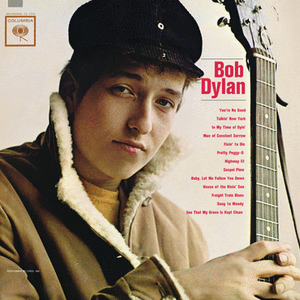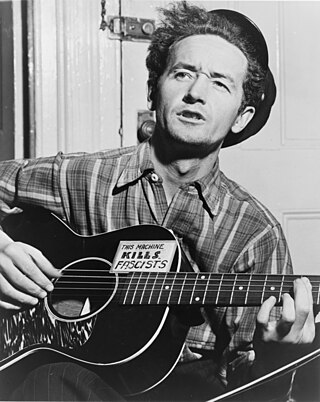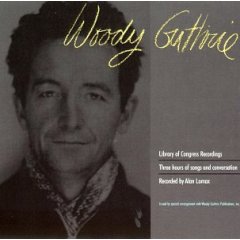
Woodrow Wilson Guthrie was an American singer-songwriter, one of the most significant figures in American folk music. His work focused on themes of American socialism and anti-fascism. He inspired several generations both politically and musically with songs such as "This Land Is Your Land".

"Stardust" is a jazz song composed by American singer, songwriter and musician Hoagy Carmichael with lyrics by Mitchell Parish. Now considered a standard and part of the Great American Songbook, the song has been recorded over 1,500 times either as an instrumental or vocal track, featuring different performers. During his time attending Indiana University, Carmichael developed a taste for jazz. He formed his own band and played at local events in Indiana and Ohio. Following his graduation, Carmichael moved to Florida to work for a law firm. He left the law sector and returned to Indiana, after learning of the success of one of his compositions. In 1927, after leaving a local university hangout, Carmichael started to whistle a tune that he later developed further. When composing the song, he was inspired by the end of one of his love affairs, and on the suggestion of a university classmate, he decided on its title. The same year, Carmichael recorded an instrumental version of the song for Gennett Records.

The term American folk music encompasses numerous music genres, variously known as traditional music, traditional folk music, contemporary folk music, vernacular music, or roots music. Many traditional songs have been sung within the same family or folk group for generations, and sometimes trace back to such origins as the British Isles, Mainland Europe, or Africa. Musician Mike Seeger once famously commented that the definition of American folk music is "...all the music that fits between the cracks."

Bob Dylan is the debut studio album by American singer-songwriter Bob Dylan, released on March 19, 1962 by Columbia Records. The album was produced by Columbia talent scout John H. Hammond, who had earlier signed Dylan to the label, a controversial decision at the time. The album primarily features folk standards but also includes two original compositions, "Talkin' New York" and "Song to Woody". The latter was an ode to Woody Guthrie, a significant influence in Dylan's early career.
The Weavers were an American folk music quartet based in the Greenwich Village area of New York City originally consisting of Lee Hays, Pete Seeger, Ronnie Gilbert, and Fred Hellerman. Founded in 1948, the group sang traditional folk songs from around the world, as well as blues, gospel music, children's songs, labor songs, and American ballads. The group sold millions of records at the height of their popularity, including the first folk song to reach No. 1 on popular music charts, their recording of Lead Belly's "Goodnight, Irene." Despite their popularity, the Weavers were blacklisted during much of the 1950s.

"This Land Is Your Land" is one of the United States' most famous folk songs. Its lyrics were written by American folk singer Woody Guthrie in 1940 in critical response to Irving Berlin's "God Bless America", with melody based on a Carter Family tune called "When the World's on Fire". When Guthrie was tired of hearing Kate Smith sing "God Bless America" on the radio in the late 1930s, he sarcastically called his song "God Blessed America for Me" before renaming it "This Land Is Your Land".

"Goodnight, Irene" or "Irene, Goodnight," is a 20th-century American folk standard, written in 3
4 time, first recorded by American blues musician Huddie 'Lead Belly' Ledbetter in 1933. A version recorded by the Weavers was a #1 hit in 1950.

Gilbert Vandine "Cisco" Houston was an American folk singer and songwriter, who is closely associated with Woody Guthrie due to their extensive history of recording together.

Ramblin' Jack Elliott is an American folk singer and songwriter.
"Deportee (Plane Wreck at Los Gatos)" is a protest song with lyrics by Woody Guthrie and music by Martin Hoffman detailing the January 28, 1948 crash of a plane near Los Gatos Canyon, 20 miles (32 km) west of Coalinga in Fresno County, California, United States. The crash occurred in Los Gatos Canyon and not in the town of Los Gatos itself, which is in Santa Clara County, approximately 150 miles away. Guthrie was inspired to write the song by what he considered the racist mistreatment of the passengers before and after the accident. The crash resulted in the deaths of 32 people, 4 Americans and 28 migrant farm workers who were being deported from California back to Mexico.

Paul Clayton was an American folksinger and folklorist who was prominent in the folk music revival of the 1950s and 1960s.

Dust Bowl Ballads is an album by American folk singer Woody Guthrie. It was released by Victor Records, in 1940. All the songs on the album deal with the Dust Bowl and its effects on the country and its people. It is considered to be one of the first concept albums. It was Guthrie's first commercial recording and the most successful album of his career.

The American folk music revival began during the 1940s and peaked in popularity in the mid-1960s. Its roots went earlier, and performers like Josh White, Burl Ives, Woody Guthrie, Lead Belly, Big Bill Broonzy, Richard Dyer-Bennet, Oscar Brand, Jean Ritchie, John Jacob Niles, Susan Reed, Paul Robeson, Bessie Smith, Ma Rainey and Cisco Houston had enjoyed a limited general popularity in the 1930s and 1940s. The revival brought forward styles of American folk music that had in earlier times contributed to the development of country and western, blues, jazz, and rock and roll music.

Contemporary folk music refers to a wide variety of genres that emerged in the mid 20th century and afterwards which were associated with traditional folk music. Starting in the mid-20th century a new form of popular folk music evolved from traditional folk music. This process and period is called the (second) folk revival and reached a zenith in the 1960s. The most common name for this new form of music is also "folk music", but is often called "contemporary folk music" or "folk revival music" to make the distinction. The transition was somewhat centered in the US and is also called the American folk music revival. Fusion genres such as folk rock and others also evolved within this phenomenon. While contemporary folk music is a genre generally distinct from traditional folk music, it often shares the same English name, performers and venues as traditional folk music; even individual songs may be a blend of the two.

American singer-songwriter Woody Guthrie's published recordings are culled from a series of recording sessions in the 1940s and 1950s. At the time they were recorded they were not set down for a particular album, so are found over several albums not necessarily in chronological order. The more detailed section on recording sessions lists the song by recording date.

The Library of Congress Recording Sessions refers to a March 1940 session of recordings Woody Guthrie made in Washington, D.C., for Alan Lomax. They were catalogued in the United States Library of Congress. They are notable as the first recordings made of Woody Guthrie. They contain several traditional songs and three of Guthrie's best known songs, "So Long It's Been Good To Know You", "Talking Dust Bowl Blues" and "Do-Re-Me". The session is also interesting for Guthrie's autobiographical memories of Oklahoma, riding the freight trains and observations on life and America's great depression in conversation with Lomax.

Ramblin' Jack Elliott Sings Songs by Woody Guthrie and Jimmie Rodgers is an album by American folk musician Ramblin' Jack Elliott. It was released in 1960 in Great Britain and in 1962 in the US on the Monitor label.

Woody At 100: The Woody Guthrie Centennial Collectionis a 150-page large-format book with three CDs containing 57 tracks, including Woody Guthrie's most important recordings such as the complete version of "This Land Is Your Land," "Pretty Boy Floyd," "I Ain't Got No Home in This World Anymore," and "Riding in My Car." The set also contains 21 previously unreleased performances and six never-before-heard original songs, including Woody's first known—and recently discovered—recordings. It is an in-depth commemorative collection of songs, photos and essays released by Smithsonian Folkways in June 2012.

The Woody Guthrie Center is a public museum and archive located in Tulsa, Oklahoma that is dedicated to the life and legacy of American folk musician and singer-songwriter Woody Guthrie. The Center also contains the archives of folk singer, songwriter, and fellow social activist Phil Ochs.
"Vigilante Man" is a song by Woody Guthrie, recorded and released in 1940 as one of his Dust Bowl Ballads.














